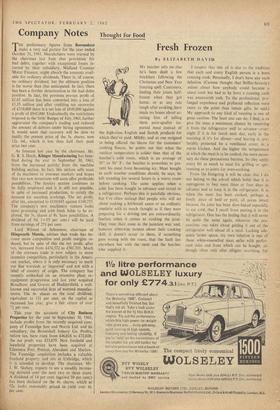T HE preliminary fi gures from Bowmakers make a very sad picture
for the year ended October 31, 1961. Shareholders were warned by the chairman last June that provisions for bad debts, together with exceptional losses in- curred by their subsidiary, Midland Counties-
Motor Finance, might absorb the amounts avail- able for ordinary dividends. There is, of course, no ordinary dividend, but the ultimate position is far worse than that anticipated. In fact, there has been a further deterioration in the bad debts position. In fact, the previous pre-tax profit of £1.67 million has been converted into a loss of £1.35 million and after crediting tax recoveries of £510,000 there is a net loss of £849,000 against a profit of £941,000. Undoubtedly the restrictions imposed in the little' Budget of July, 1961, further aggravated the company's trading and reduced the amount of debtors under hiring agreements. It would seem that recovery will be slow to justify the present price of the 5s. shares, now 12s. 6d., which is less than half their peak price last year.
As forecast last year by the chairman, Mr. G. R. S. Doyle, Klinger Manufacturing has bene- fited during the year to September 30, 1961, from the increased activity from the machine building section. In fact, this section sells most of its machines to overseas markets and hopes that two new inventions will soon offer profitable possibilities. The hosiery section continues to be fully employed and it is still not possible, in spite of increased production, to satisfy the demand for seamless stockings. The net profit, after tax, amounted to £110,045 against £100,755.
The company's new machinery venture looks most promising and with fresh fields to be ex- plored, the 5s. shares at 8s. have possibilities. A dividend of 9d. (=15 per cent.) will be paid from earnings of 271 per cent.
Lord Wilmot of Selmeston, chairman of Illingworth Morris, advises that trade has be- come more competitive and profit margins re- duced, but in spite of this the net profit, after tax, increased from £476,572 to £501,705. Much of the overseas trade is now subject to more intensive competition, particularly in the Ameri- can market, where it is only necessary to mark our fine worsteds as 'imported' and not with a label of country of origin. The company has recently embarked on an extensive plant re- equipment programme and last year acquired Broadbent and Graves of Huddersfield, a well- known and successful firm of worsted manufac- turers. The 4s. shares on the total dividend, equivalent to 134 per cent. on the capital as increased last year, give a fair return of over 71- per cent.
This year the accounts of City Business Properties for the year to September 30, 1961, include profits from the recently acquired com- pany of Fassnidge Son and Norris Ltd. and its subsidiary, the Broomhall Joinery Go. Profits, before tax, have risen from £46,818 to £72,028; the net profit was £33,879. New freehold and leasehold properties have been acquired at Ellesmere Port, Prescot, Aberdeen and Marlow.
The Fassnidge acquisition includes a valuable freehold property and site at Uxbridge, which it is intended to develop. The chairman, Mr. J. W. Skelsey, expects to see a steadily increas- ing demand over the next two to three years. A dividend of 14 per cent. (against 10 per cent.) has been declared on the 4s. shares, which at 12s. looks reasonably priced to yield over 41- per cent.


































 Previous page
Previous page